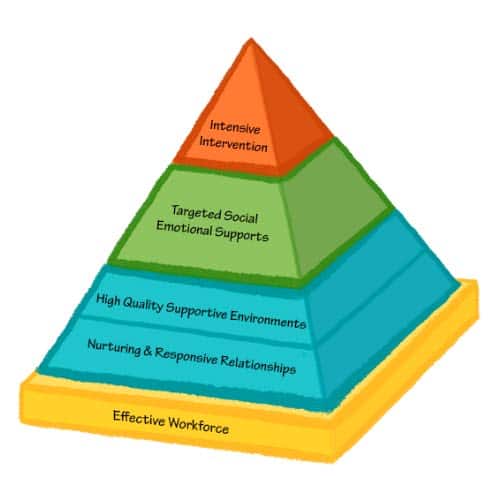Pyramid Model Training
The Pyramid Model is an evidence-based framework that promotes healthy social and emotional development as a way to address challenging behavior. The Model is a tiered approach built on the foundation of an effective workforce who provides universal supportive environments and nurturing relationships to all children. The secondary tier focuses on targeted social emotional teaching to children who need additional support in developing social emotional skills. The top tier targets those children whose needs have not been met through the previous tiers and need additional support through individualized interventions.

Pyramid Model Modules:
Module 1 (Blue Tier): Nurturing Relationships and Supportive Environments 3 hours
Module 1 focuses on:
Building strong relationships, classroom design, schedules and routines, transitions, directions and feedback, behavior expectations and rules
Module 2 (Green Tier): Targeted Social Emotional Supports 3 hours
Module 2 focuses on:
Friendship skills, emotional literacy, anger management/impulse control, and problem solving
Module 3 (Red Tier): Intense Individualized Interventions 4 hours
Module 3 focuses on:
Understanding the form and function of behavior, implementing replacement skills for challenging behavior, and creating a behavior plan for challenging behavior
**Pyramid Modules are trained in sequential order and cannot be trained outside of that order.
Pyramid Model Training
Early experiences literally shape early brain architecture, establishing either a sturdy or a fragile foundation for all of the development and behavior that follows. The overarching message from science is clear: how children develop early in life matters later for their educational achievement, economic productivity, and lifelong health. Adverse Childhood Experiences (ACEs) research builds our collectively responsibility to take action across sectors in promoting healthy child development for the future prosperity of the next generation.
Adverse Childhood Experiences Training
- Understand how brain architecture is established early in life and supports lifelong learning, behavior, and health.
- Describe the role of safe, caring relationships and “serve and return” interactions in shaping brain architecture.
- Understand the impact of toxic stress on neurodevelopment and biological functioning across the lifespan.
- Introduce the Adverse Childhood Experiences (ACE) research and related poor social, emotional and physical health outcomes.
- Recognize the dynamic micro and macro approaches to building resilience in children and communities to support positive outcomes to benefit citizens’ shared prosperity.
- Identify innovative, evolving public health strategies to improve population health.
This presentation is supported by Building Strong Brains: Tennessee ACEs Initiative, a public-private partnership working to change the culture of Tennessee’s early childhood philosophy from “What is wrong with you?” to “What happened to you?” This shift results in a more effective, more empathic approach to the design of early childhood programs and policies.
For more information or to request a training, please complete and submit the form below.



